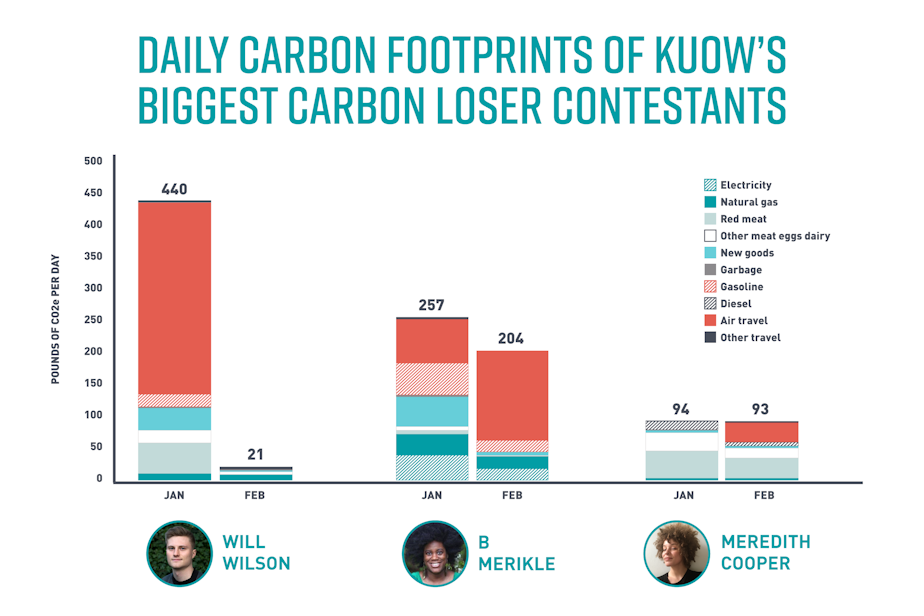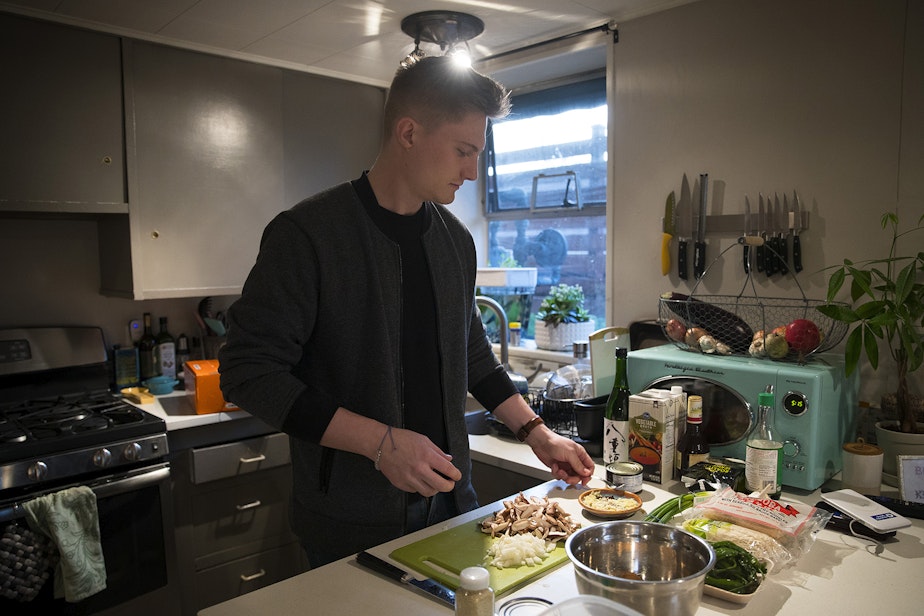KUOW crowns the Biggest Carbon Loser
A global emergency endangers the health of billions and shows no signs of ending any time soon.
Coronavirus? Yes, but this time, we’re talking climate change.
You may remember back in January B.C. (Before Coronavirus), KUOW launched its Biggest Carbon Loser contest. Three Seattle-area contestants competed to slash their carbon footprints as deeply as they could and give us a sense of what’s possible when it comes to fighting climate change.
We followed their efforts for two months: January to establish a baseline and February to shed as many pounds as they could from their personal carbon footprints by changing how they got around and what they bought and ate.
One of our contestants slashed their carbon pollution 90% in a matter of weeks.
Others succeeded at making deep cuts in the planetary harm their lives caused, only to have a single high-carbon activity -- a plane trip -- wipe out most of their progress.
As we were about to announce the biggest loser, coronavirus put life as we know it, and our little contest, on hold.
Sponsored
To celebrate the 50th anniversary of Earth Day, KUOW brought the carbon-slashing contestants together, virtually, to see how their lives have changed and to reveal our Biggest Carbon Loser.
Hey KUOW, why a contest for The Biggest Carbon Loser?
It may seem odd to discuss a climate change contest in the midst of a global pandemic.
Much more consequential events have been pushed aside: Global climate talks set for November in Scotland have been postponed until 2021 (the site where they were to be held has been turned into a pandemic field hospital.)
Still, the climate hasn’t stopped heating up.
Sponsored
During the pandemic, carbon emissions have dropped temporarily as people stay home and as much of the economy goes dormant.
But that climate-wrecking pollution is expected to roar back once the economy is unleashed. Just like the coronavirus emergency, the longer action on the climate emergency is delayed, the harder it will be to solve.
“Covid-19 is the most urgent threat facing humanity today, but we cannot forget that climate change is the biggest threat facing humanity over the long term,” UN Climate Change Executive Secretary Patricia Espinosa said in a statement announcing the delay of the crucial negotiations.
Making deep cuts
The Biggest Carbon Loser contestants kept tabs on nine categories of personal carbon emissions, from fuel, electricity, food and consumer goods. Each of them received advice from a carbon coach on the most effective ways to reduce emissions, then changed their travel, shopping and dietary routines however they could.
Sponsored
With her kids’ help, contestant B Merikle of Snoqualmie managed to reduce her suburban home’s electricity and natural gas use in half and her gasoline purchases by two-thirds.
“We saw pretty quickly a pretty precipitous drop in the cost of our energy and how much energy we were using,” she said.
Her Seattle nonprofit let her work from home two days a week and avoid the 27-mile drive in from Snoqualmie.
Meredith Cooper, an apartment manager in dense, transit-friendly Capitol Hill, started out with a much lower carbon footprint than her competitors. She managed to cut back on her biggest source of carbon emissions—red-meat consumption by her and her dog Sun Ra—by a third.
“I keep thinking how big of a privilege it is to be able to think about cutting back your carbon,” she said.
Sponsored
Frequent flyer, SUV driver and bus commuter Will Wilson of Ballard all but eliminated red meat, driving and flying from his usual high-carbon lifestyle.
“It’s not as hard as I originally thought it would be to take an extra step and think about what it is that I’m doing,” he said.
“I realized I was pretty adaptable to making big changes.”
The envelope, please!
Toward the end of the contest, Cooper and Merikle had similar setbacks: Their jobs required them to fly out of state. Their flights to Los Angeles and Atlanta, respectively, quickly undid most of a month’s carbon-saving efforts.
Sponsored
Wilson managed to resist his wanderlust for the entire contest.
By the end of February, Wilson had cut an estimated 95% off his carbon footprint.

He shaved more than 400 pounds off his daily footprint, down to a daily average of just 21 pounds of carbon dioxide, less than one-fourth the runners-up.
By doing so, Wilson went from being the contest’s biggest polluter to KUOW’s Biggest Carbon Loser.
Long-lasting changes
Contestants said they expected to continue many of the carbon-saving ways they picked up during the contest after pandemic-driven mandates to stay at home are lifted.
“I'll probably go on some drives and hikes and things like that,” Wilson said. “But I don't need to jump on an airplane and, you know, fly halfway across the world.”
Wilson said being stuck at home has given him time to experiment in the kitchen with veggie burgers and other low-carbon, plant-based foods.
Merikle, who changed jobs in early March, said her former employer had a visceral resistance to letting people work from home. Now it’s the norm for millions.
“'Zoom' was a bad word then,” Merikle said, referring to the now-ubiquitous teleconferencing app.
“There are tons of people who can work from home and don’t need to be commuting all the time,” Cooper said. For her primary job as an apartment manager, she has long worked from home. Now her work includes sterilizing doorknobs and other shared surfaces around the building.
Cooper said the governmental response to the pandemic has expanded her sense of what’s possible on climate change.
“I think that the government’s showing, for all of its talk of how we can’t support people to make big systemic change, that they can actually mobilize billions of dollars really fast to make things happen,” she said. “In the future, when they say they can’t do that, we’ll know it’s a lie.”
Climate-shaping policies continue to be made in government offices and corporate headquarters, though they make fewer headlines than they did pre-pandemic.
The Trump administration has weakened fuel-economy standards for cars, the nation’s leading source of carbon pollution, and is continuing to advance its agenda to loosen pollution and safety regulations wherever possible.
Climate activists and some Congressional Democrats, meanwhile, argue that the need to stimulate a pandemic-stricken economy strengthens their case for a “green new deal” of massive government investment in climate-friendly infrastructure.
These kinds of big decisions dwarf the impacts that most individuals can have.
That's why climate experts say that individual actions can help--they can signal that climate change is a dire problem that we all need to take seriously--but they’re no substitute for solutions at more systemic levels.
While their carbon coaches spoke with them about the government policies and business decisions that continue to fuel the world’s climate crisis, none of the Biggest Carbon Loser contestants reported getting more involved politically as a result of their climate concerns.
In addition to getting to lead by example and having the satisfaction of living in line with his values, Biggest Carbon Loser Will Wilson will also receive a New York Times digital subscription and a free bike-maintenance class at Seattle’s Bike Works.
All three contestants will also get passes to the Burke Museum and Seattle Art Museum and a collection of reasonably earth-friendly KUOW swag, including a solar-powered emergency radio and “Public Radio Nerd” pint glasses.
Congratulations to all!





